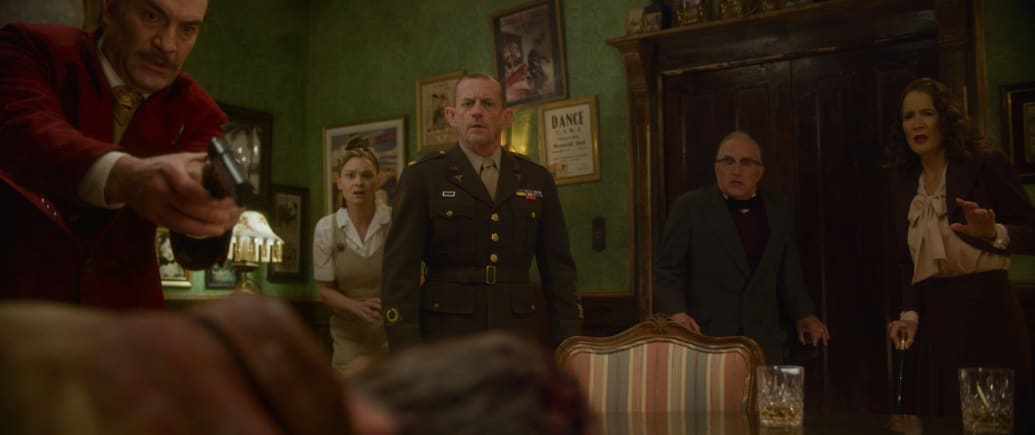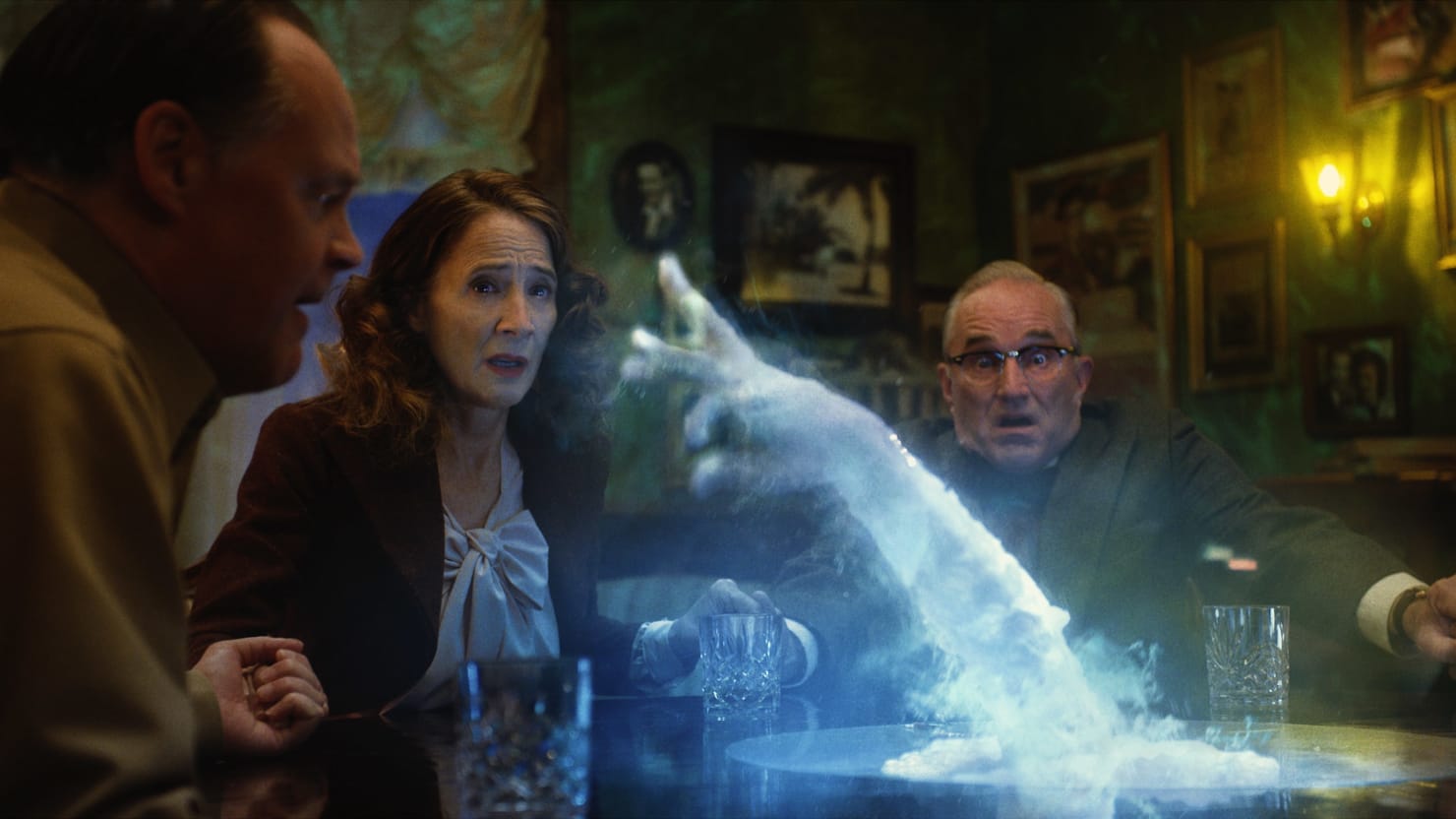A hothouse horror chamber piece that blends Roman Polanski’s Death and the Maiden and Sidney Lumet’s Twelve Angry Men with gothic ghost stories and Agatha Christie mysteries, Brooklyn 45 (which premieres June 9, on Shudder and AMC+) finds writer/director Ted Geoghegan (Mohawk, We Are Still Here) once again pushing indie genre filmmaking down unique and surprising return-of-the-repressed paths.
Infused with timely sociopolitical notions about prejudice, intolerance and truth, and free of pat, pandering conclusions, it delivers supernatural and Earthly suspense in a period-piece package whose wit and personality help overshadow its rougher bump-in-the-night patches.
Two days after Christmas 1945, with the taste of World War II blood and ash still fresh in their mouths, four military friends gather at the Brooklyn brownstone home of Lt. Col. Clive Hockstatter (Larry Fessenden). Marla Sheridan (Anne Ramsay) is the country’s foremost interrogator, which is not the same as being a torturer—or so says her Pentagon pencil-pusher husband Bob (Ron E. Rains). She’s greeted warmly by old friend Major Archibald “Archie” Stanton (Jeremy Holm), but Bob cares little for this dashing man, referring to him as a “war criminal” due to a combat incident whose particulars will eventually come to light.
Beating them all to Clive’s home is Major Paul DiFranco (Ezra Buzzington), a stern, humorless commander who’s arrived wearing his army uniform and isn’t going lightly on the alcohol. Clear heads, as it turns out, are in short supply, including when it comes to Clive, whose mind has been clouded by both booze and grief over a recent tragedy that’s the impetus for this get-together.
Aside from introductory and closing scenes set on the sidewalk and front parlor of Clive’s abode, Brooklyn 45 takes place wholly inside this residence’s inviting drawing room, where everyone gathers to celebrate the end of the war, to congratulate each other on their successful tours of duty, and to console Clive over the death of his wife Susan, who recently took her own life. Geoghegan slowly divulges that piece of information as well as various additional details about his characters, including the condescension that Paul and Archie feel toward Bob (due to his lack of battlefield experience), Archie’s not-so-subtle romantic interest in Marla, and Paul’s staunch loyalty to Clive, who seems more than a bit off during the early-going.
Though the material boasts an inherent staginess (and would therefore feel right at home in an off-Broadway theater), there’s nothing stilted about Geoghegan’s writing, which gracefully establishes its scenario, players, and fraught dynamics.
Brooklyn 45 opens in boxy black-and-white before expanding outward into Technicolor-esque widescreen, and its story swells likewise, gradually revealing grander emotional, psychological and political dimensions. Guilt-ridden Clive is still hung up on the fact that, before she killed herself, Susan believed that her neighbors were sly Nazi spies, and he didn’t believe her. This paranoia was so great that Marla knew about it, and the resultant air of distrust is matched by a concurrent sense of secrets swirling around these protagonists—most notably Archie, whose scandalous reputation is a weight to be shouldered, if also to be superficially dismissed with a dashing Clark Gable-esque smile and matching good cheer. Everyone is acting normal on the surface, yet beneath, something sinister lurks.
As befitting a spooky affair such as this, things take a turn for the macabre when Clive explains his motivation for bringing his old pals together again. Haunted by Susan’s demise, and distressed by his reverend’s suggestion that his pious wife’s suicide might leave her in Hell (a notion that strikes him as more preposterous and insulting by the minute), Clive no longer cares about faith; what he covets is proof of the afterlife’s existence.
To attain that, he asks everyone to participate in a séance around a circular mirrored table, using Susan’s locket and handkerchief to hopefully summon her spirit and, in doing so, to verify that there’s something waiting for us on the other side. After much resistance, Clive’s guests agree, only to be shaken when evidence of the hereafter actually materializes, prompting Clive to make a dramatic decision, as well as exposing his other secret: in a closet, he’s tied up Hildegard Baumann (Kristina Klebe), the German neighbor whom Susan suspected of being a clandestine Nazi.
Brooklyn 45 thus transforms into a potboiler, its temperature raised by suggestions of paranormal activity beyond human control, and by suspicions regarding the true identity of Hildegard, who claims to be an innocent victim of Susan’s mad discrimination but whose protests don’t ring wholly true. Revelations about the rest of these individuals’ crimes and prejudices soon come into focus, as does their still-fresh PTSD and their struggles to come to terms with the ugly (and sometimes unthinkably monstrous) demands of war.
With specters hovering all around them—thereby calling into question the reality of both the action at hand, and of these men and women themselves—Geoghegan ratchets up the tension, his precise camerawork heightening the frictions between Marla, Bob, Archie, and Paul, the last of whom becomes convinced that Susan was right about Hildegard and, moreover, that he must carry out a terrible deed on Clive’s behalf.

Courtesy of Shudder
There are times in its latter half when, in service of its guessing-game drama, Brooklyn 45 flirts too closely with moral equivalency as it relates to American and German WWII conduct. However, thanks to assured performances from its entire cast (and, in particular, revered indie auteur Fessenden), as well as a script that knows better than to indulge in didacticism, Geoghegan’s film by and large maintains its course.
That it keeps one off balance all the way to its bracing finale is a testament to the director’s skill. Just as pleasurable, though, is its ability to segue on a dime between interpersonal conflict and ectoplasmic unholiness, culminating with the type of squishy gruesomeness designed to satisfy gorehounds. War is hell and potentially everlasting in this claustrophobic thriller, and so too is the unnerving realization that, in the final tally, we don’t know anything at all—about ourselves, each other, or a world whose preservation requires atrocities of disturbing proportions.
Liked this review? Sign up to get our weekly See Skip newsletter every Tuesday and find out what new shows and movies are worth watching, and which aren’t.
This post originally appeared on and written by:
Nick Schager
The Daily Beast 2023-06-08 17:57:00

